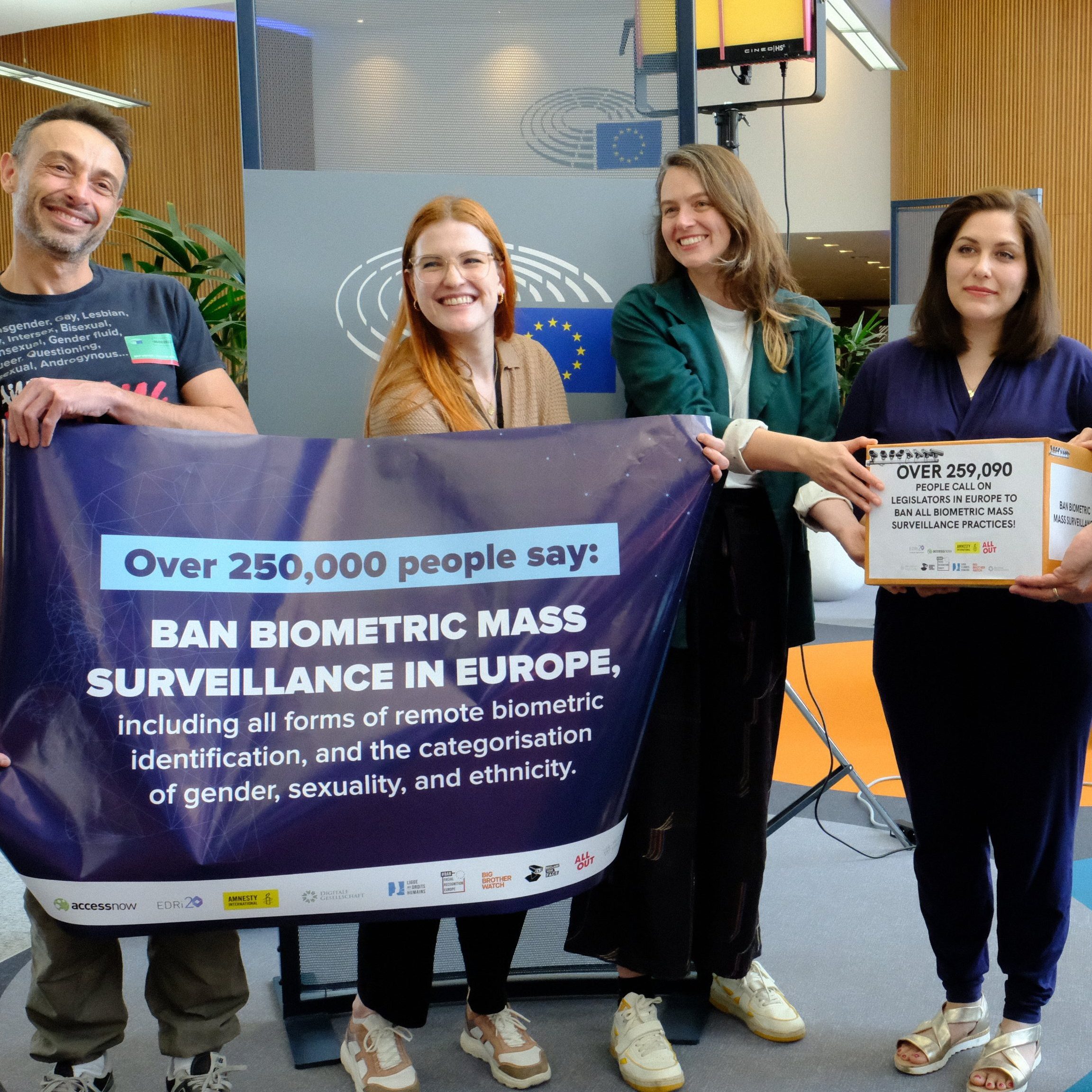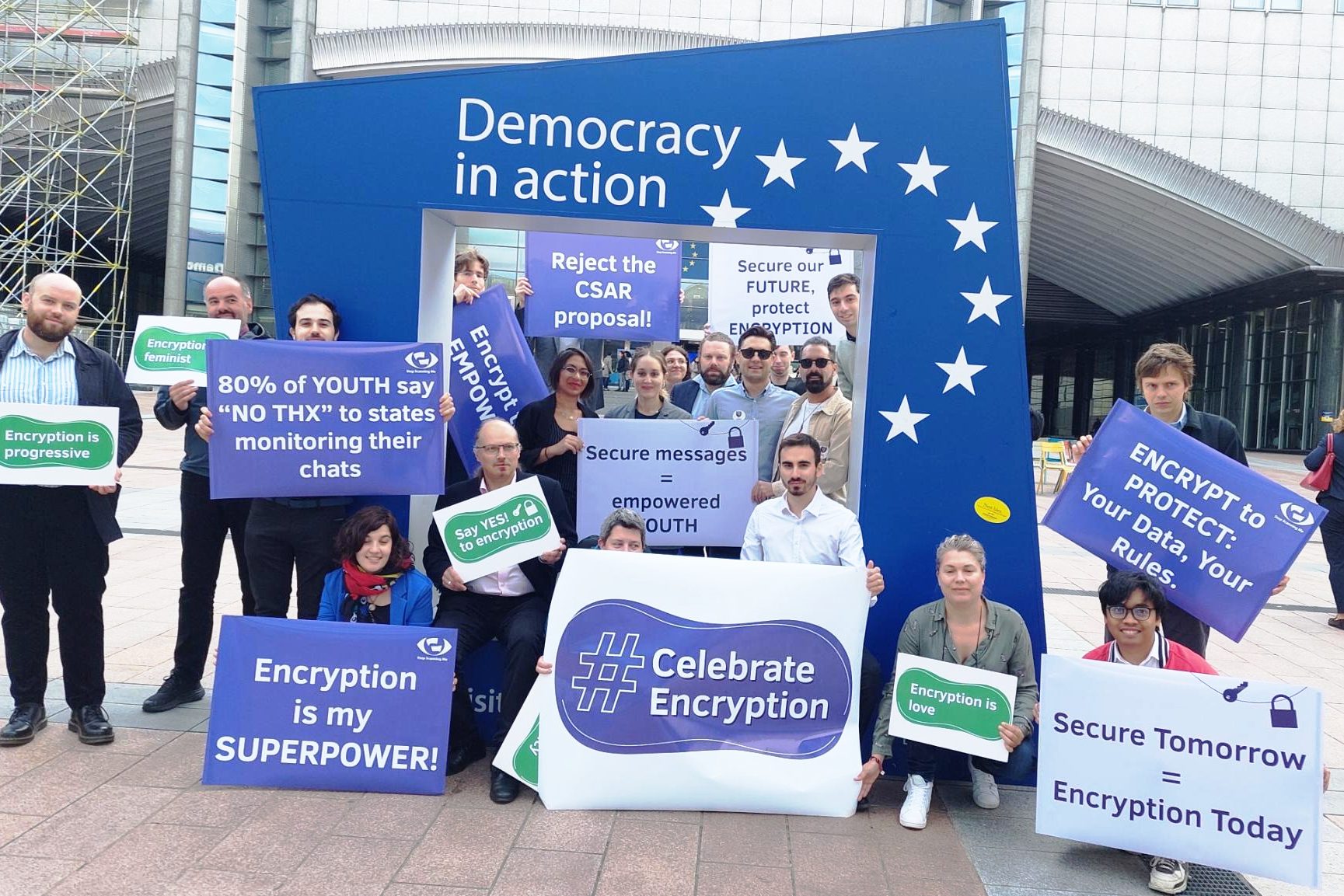Viktoria Tomova and Shubham Kaushik on the European Digital Rights (EDRi) network’s transformative vision for EU digital policy.
In recent years, protecting and advancing digital rights feels like a never-ending battle as more and more of our lives get entangled with the digital world. Challenges to our freedoms online and offline continue to pile up as we face tech corporations with ginormous budgets and states with carte blanche to do anything for ‘national security’ reasons.

In the last five years, EU lawmakers moved one step forward, and three steps back when it came to putting people first in their tech legislation. They passed an Artificial Intelligence (AI) law that did not center people’s rights, proposed full-fledged attacks on the confidentiality of our communications and passed a lukewarm law to regulate platforms like Facebook and Instagram.
The war in Ukraine and the siege against Gaza have heightened everyone’s appetites for securitisation narratives. At the same time, winds are blowing in the direction of AI hype, leaving important human rights considerations in the dust.
In this context, together with broader social movements, European Digital Rights (EDRi) has been challenging power imbalances and protecting digital rights. Throughout the last 20 years, EDRi has served as the backbone of Europe’s digital rights movement – and we’re determined to continue in the face of all obstacles and changing contexts.
And the context is about to change. 2024 will see many elections throughout the world, but also in Europe. The June EU elections are an opportunity to get our message to newly-elected politicians, and to turn our vision of people-centred democratic future into reality.


Nothing changes if nothing changes: imagining alternatives through collective positive narratives
One of the key ways to affect change on EU digital policies is through changing the narrative around technology and digital spaces. EDRi has been doing transformative narrative work along with racial and social justice organisations through a decolonial approach to digital policy, stories about communities, and by developing a positive vision for our digital futures.
Allowing people to imagine alternatives gives all of us a common goal to collectively work towards. We have seen the impact of this in the work we have done in two of the most debated digital laws in the recent years: the AI Act and the fight to defend confidentiality of communication in the Child Sexual Abuse Regulation (CSAR) file.
Putting people and empowering narratives at the heart of AI Act advocacy
EDRi and our partners tenaciously advocated for an AI Act that prioritises people from the very beginning of the legislative process. When the law was initially proposed by the Commission in 2020, protecting our fundamental rights seemed to be more lip service than reality. Together with a broad range of digital, human rights and social justice organisations, we influenced the conversation through our collective vision.Our positive values-based framing was also reflected in our Reclaim Your Face campaign, which explained to people what’s at stake in clear, easy-to-understand terms. Supported by 80 organisations around Europe, we put banning biometric mass surveillance on the lawmakers’ agenda, and mobilised over 250,000 people to support us in this effort.
EDRi also convened a variety of civil society and expert voices to develop a collective narrative about the AI Act. We did this to challenge the dominant state and industry driven narratives which centre technosolutionism and innovation-at-all-costs. At the heart of all our efforts were the interests of communities who would be most harmed by feckless regulation. We listened to stories of people with a migration background, racialised communities, people with disabilities, and other groups who have lived experiences of technological harms.
Our work on transforming narratives helped us face many challenges. We overcame some of the lack of political will by lawmakers, who were being pulled by the billions of euros spent by tech lobbies to water down the AI Act for the sake of their profits. Our work made the pitfalls of going down the ‘innovation at any cost’ rabbit hole clear to decision-makers and the public.
Envisioning encryption: positive spin on privacy and child safety
Similarly, the Stop Scanning Me campaign led by EDRi and our members used narrative change to turn the political debate on encryption 180 degrees.
Some of the key challenges we faced during the legislative process were administrative malpractices and abuses of power stemming from the European Commission’s Department leading the CSAR law (DG HOME) and its Commissioner, Ylva Johansson. We publicly scrutinised the lack of transparency, inclusion and accountability in the EU institutions responsible for the legislative process. To do this, we developed a consistent and coordinated dissemination of a positive framing around encryption, prioritising the lived experiences of those most impacted by the law.
Our online communication centered values-based testimonies from academics, journalists, tech experts, privacy-protecting companies, young activists, lawyers, and child rights groups. Given how deeply encryption affects people from different walks of lives, we brought some of these people to Brussels to meet with key EU policymakers. By framing encryption as essential to everyone’s security, we made it politically difficult for the opposition’s technosolutionist argument to be used as a justification for legalising mass surveillance.
Furthermore, in our narrative, we tackled the securitisation push guised behind children’s rights. We created alternative solutions that moved the political focus from weakening privacy and increasing mass surveillance to developing more sustainable measures.
From vision to reality: a positive digital future is within reach
The critical work the EDRi network has been doing on protecting people’s privacy through narrative change and a people-focused policy approach has been instrumental in impacting EU policy-making.
EDRi along with DFF have led a two-year process for building a programme to decolonise digital rights field in Europe. The programme – which was developed with over 30 social and racial justice movements – aims to address power dynamics in the field and imagine a vision for anti-colonial digital futures.
Additionally, we co-developed The Future Is Now: a series of short utopian fictional stories which help us reimagine and reinforce healthy alternatives to the current systems. Through these, we envisioned a future in which people, the planet and technology connect to build digital spaces where we can all thrive.
Drawing on all of our previous efforts, EDRi published a manifesto that establishes a positive vision for our digital futures. We’ve set ambitious goals, which are achievable if we unite in our struggles – from digital to climate to social to democratic justice This manifesto is a guiding light for influencing the agenda of the upcoming elections and EU’s digital policies in the next years.

Shubham Kaushik is Communications and Media Officer at EDRi. She leads EDRi’s campaigns and communications on AI, biometrics, migration and tech, and climate justice. She has experience as an independent journalist in India and comes from an academic background in social science.
Viktoria Tomova is Communications and Media Officer at EDRi. Viktoria leads EDRi’s campaigns and communications on encryption, CSAR, age verification, platform power, decolonising the digital rights field process and a positive vision for digital futures. She is also a Public Voices Fellow on Technology in the Public Interest with The OpEd Project & The MacArthur Foundation.



